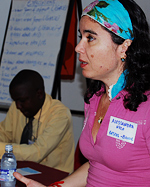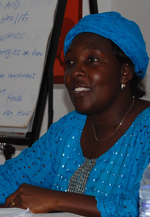With the presence of thirty-six people representing Uganda’s networks of people living with HIV, non-governmental organizations, and two government ministries (Gender and Development, and Health), the III UNGASS-AIDS Forum met for two days at the Nob View Hotel, in Kampala, on June 4th and 5th, to design advocacy strategies for monitoring the government’s commitment to dramatically reduce the incidence of HIV/AIDS while securing sexual and reproductive health and rights of women and girls.

III UNGASS-AIDS Forum Uganda, Ntinda, Kampala.
The opening remarks by Beatrice Were, Executive Director of UGANET—Uganda Network on Law Ethics and HIV/AIDS—were focused on the human rights of people living with HIV/AIDS. “UGANET, in existence for fifteen years, was created to fill in a vacuum at a time when the epidemic was treated as a medical issue alone”, highlighted Were. In addition, she hoped for a fruitful partnership with Gestos to set forth a movement able to produce a study and a strategy for action.

Ms. Alessandra Nilo addresses the Forum. Mr. Musiime Michael Koima sits behind her.
Gestos’ Executive Director, Alessandra Nilo, set the desired tone for the large picture. “The role of this project is not only to produce a research to send to UNAIDS, but to stimulate the AIDS and women’s movements to work together toward making their government accountable, therefore improving the AIDS response throughout the country.”
The first session of the Forum was devoted to the analysis of the report produced by UWONET—Uganda Women’s Network—, the research results of the first phase of the Monitoring Women’s Sexual and Reproductive Health project, based on the UNGASS-AIDS goals and commitment. The national coordinator of the I and II Uganda Forum, Carol Indembe, showed a bleak picture of the country situation: “Are we able to get prevention, care, social support for women? Our report brought out the reality that it is not so, particularly if you are a woman.” According to the former forum’s coordinator, the report also confirms that gender unbalance is the main driver for the epidemic in Uganda. “What is being done to overcome that when the women have to share the drugs they are entitled to with their husbands or children?” Cultural tradition makes this issue even more complex when those women say, for example, “what my husband says is what I say.”

Ms. Indembe addresses the Forum.
Another great problem, explained Indembe, is that women are still not financially independent. “Women walk in the clinic and you help them, but if they are not economically empowered they go back to their torturer husbands. The day this woman was able to buy her own clothes was the moment, she said, that she was liberated.”
The coordinator of UNYPA—Uganda Network of Youth Positive Attitude—Paddy Masembe, followed the program by sharing his experiences as the only civil society representative at the UNGASS-AIDS High Level Meeting in New York, June 2008. As part of the country delegation he witnessed the reality behind his country’s representation. “Three government delegates participated as member of the National Delegation but they were usually not present in the sessions, they only appeared in the end of the day.” Mr Mesambe, a 26 year old AIDS activist, reported that members of civil society were left out of the HLM because of political reasons. “I made to the meeting by using resources mobilized by Gestos, but I later discovered that there were resources in Uganda to fund my participation and I was denied that.”
Action Plan
The result of those two days of discussion was a strategic advocacy plan to be implemented in the next two months. By shear division of expert labour, the Forum’s participant will execute a set of activities to bring about awareness on sexual and reproductive health and rights in the country, including lobby, communication, and networking. Furthermore, there will be a research on the state of women’s SRH in Uganda, focusing on three areas: violence against women, sexual education and sexual and reproductive actions.
The UNGASS-AIDS Forum coalition will formally introduce itself to high ranks of government and the parliament. It will call attention to its monitoring tasks and will report on the government accountability toward the Declaration of Commitment to HIV/AIDS it signed in 2001. In a country with many economic and social difficulties as Uganda, “citizens or receivers of public services should be empowered to demand accountability” summarized Beatrice Were. But she also admitted that they are not able do it as a single organization. “It is very critical that there is collective responsibility and sharing of information, all the time.”
Hope is in the air
The coalition united around a set of goals that include negotiating with the private sector and the government in an open, sincere, professional (‘strictly health business’) way. The objective is to build bridges and establish a sustainable dialogue toward improving SRH in a path to achieving universal access to all who need it in Uganda, a most beautiful country, bountifully blessed by nature in all levels, that has been for too long scarred by political evil-doers. Times have politically and economically changed – despite the current global crisis. The prospect for establishing rational civil relations is as positive as ever was. This is an opportunity the UNGASS-AIDS Forum Uganda is about to take on.

Participants of the III UNGASS-AIDS Forum Uganda



 Posted by ungassforum
Posted by ungassforum